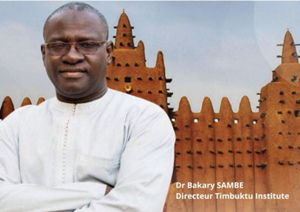No CrossRef data available.
Article contents
Interview with Bakary Sambe
Regional Director of the Timbuktu Institute
Published online by Cambridge University Press: 12 May 2022
Abstract

Bakary Sambe is Regional Director of the Timbuktu African Institute for Peace Studies (Dakar, Niamey, Bamako). Founder of the Observatory of Religious Radicalism and Conflicts in Africa, Sambe is a teacher–researcher at Gaston Berger University in St Louis (Senegal).
Sambe's current work focuses on endogenous strategies, cross-border dynamics and experimenting with agile approaches in crisis zones. An expert working with the United Nations, European Union, African Union, etc., he has notably designed and led advocacy for the establishment of the regional group for the prevention and fight against radicalization of the G5 Sahel (CELLARD), assisted in the process of developing national strategies in Niger, Burkina Faso and the Central African Republic, and produced the first manual of good resilience practices.
In addition to numerous articles, Sambe has published several books: Islam et diplomatie : la politique africaine du Maroc (2010–2011), Boko Haram : du problème nigérian à la menace régionale (2015) and Contestations islamisées : Le Sénégal entre diplomatie d'influence et islam politique (2018).
- Type
- Perspectives
- Information
- International Review of the Red Cross , Volume 103 , Issue 918: The Sahel , December 2021 , pp. 807 - 816
- Copyright
- Copyright © The Author(s), 2022. Published by Cambridge University Press on behalf of the ICRC.
Footnotes
This interview was conducted by Bruno Demeyere, Editor-in-Chief of the International Review of the Red Cross.
References
1 Movement for Oneness and Jihad in West Africa.
2 See Bakary Sambe, "Les pays côtiers face à la menace terroriste : comment éviter les ‘erreurs’ du Sahel ?", Timbuktu Institute, 7 December 2021, available at: https://timbuktu-institute.org/index.php/toutes-l-actualites/item/531-les-pays-cotiers-face-a-la-menace-terroriste-comment-eviter-les-erreurs-du-sahel (all internet references were accessed in March 2022).
3 International Crisis Group, “The Niger–Mali Border: Subordinating Military Action to a Political Strategy”, Report No. 261, 12 June 2018, available at: https://www.crisisgroup.org/africa/west-africa/mali/261-frontiere-niger-mali-mettre-loutil-militaire-au-service-dune-approche-politique.
4 The Agreement for Peace and Reconciliation in Mali (Algiers Agreement) was signed in Bamako on 15 May and 20 June 2015 by the Republic of Mali and the Coordination of Azawad Movements (CMA).
5 Nathalie Prevost, “Les accords se multiplient entre les Djihadistes peuls et les autres ethnies", Mondafrique, 29 April 2021, available at: https://mondafrique.com/les-accords-entre-les-peuls-et-les-djihadistes-pourraient-embraser-le-mali/.




